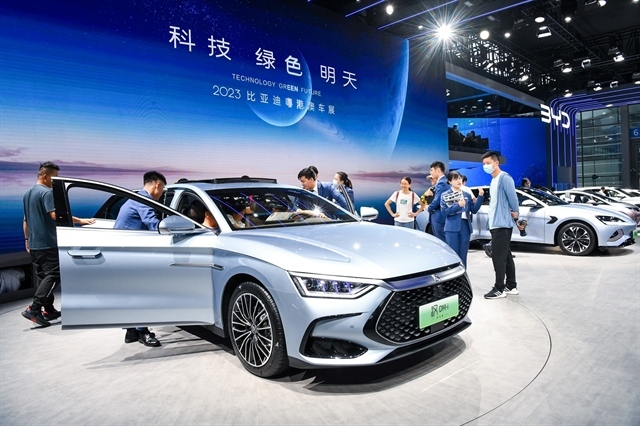Local automobile market will see a big influx of Chinese car brands
Society – Economy - Ngày đăng : 10:22, 21/06/2024

Brands like Omoda, Jaecoo, BYD, Haval and Lynk & Co. are aggressively pushing into the market, aiming to capitalise on Vietnam's growing demand for cars as the country is undergoing an automobilisation phase with rising average incomes.
Chinese car manufacturers are rapidly establishing showrooms and dealerships across Vietnam. For example, BYD plans to open 50 showrooms by mid-2024 and Haval aims to have 25-30 dealerships this year. This aggressive expansion contrasts with the cautious approach of many traditional international brands.
Chinese automakers are investing heavily in local production facilities. Omoda and Jaecoo will soon start operating a factory with an annual capacity of 200,000 cars in Thai Binh Province. BYD is also considering building an automobile factory in Vietnam.
The Chinese brands are offering a range of vehicles including petrol models, plug-in hybrids and pure electric vehicles (BEVs). This diverse product lineup is aimed at catering to various segments of the Vietnamese market.
Chinese brands are particularly targeting young Vietnamese consumers who are quick to adopt new technologies, including electric vehicles (EVs). BYD, for example, aims to leverage its expertise in EVs to penetrate the market further.
While these brands have ambitious goals to capture a significant market share in Vietnam (with Omoda and Jaecoo aiming to have ten per cent of the market by 2028), hitting those targets in a competitive market will require time and sustained effort.
The reception of Chinese cars among Vietnamese consumers will be critical. Brands like Lynk & Co are focusing not just on selling cars, but also on creating community.
Liu Xueliang, the CEO of BYD, emphasises the strategic importance of Vietnam as a key market for their expansion. He highlights several factors that make Vietnam attractive, particularly the fact that the country has a large population, over a hundred million, with a significant proportion being young people. This demographic is crucial because young consumers are typically early adopters of new technologies, including electric vehicles (EVs).
BYD aims to leverage its existing technological capabilities to cater to these market dynamics. While acknowledging the presence of price competition in the market. Liu emphasises that BYD's focus lies in maintaining leadership through its core technologies in electric vehicles.
Omoda and Jaecoo Auto Vietnam, are instead focusing on achieving ambitious market share targets by strategically importing a variety of vehicle types initially and transitioning to local assembly. Their approach includes adhering to global 3S standards in showrooms to provide a premium customer experience, emphasising comfort and luxury.
Nguyen Dang Quang, overseeing sales and dealer development for Omoda and Jaecoo, says the company has a phased plan, capturing three per cent market share by 2025, rising to 6% with locally assembled vehicles by 2027 and achieving 10% market share and a top five position post-2028.
This strategy underscores their intent to grow progressively and solidify their presence in Vietnam's competitive auto sector.
On the other hand, Lynk & Co is adopting a community-oriented approach with its Lynk & Co Center and Clubs model. This innovative concept goes beyond traditional showrooms by integrating sales, after-sales services and community events. By fostering a social environment where customers can engage with the brand and each other, Lynk & Co aims to appeal directly to young consumers who value connectivity and unique experiences.
Customers often chose to buy a second car from China, suggesting a growing familiarity and acceptance of Chinese vehicles among Vietnamese consumers. This trend indicates a favourable perception that could facilitate further market penetration and growth for Chinese brands in Vietnam.
